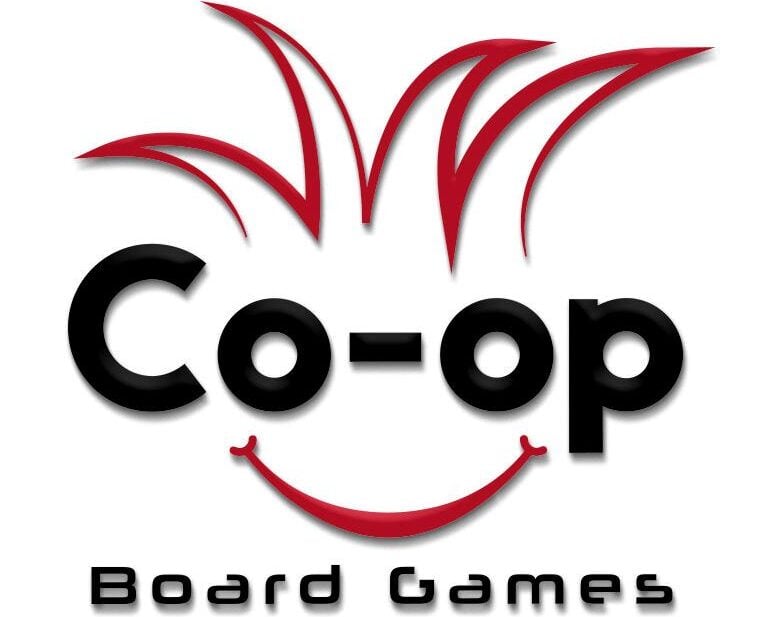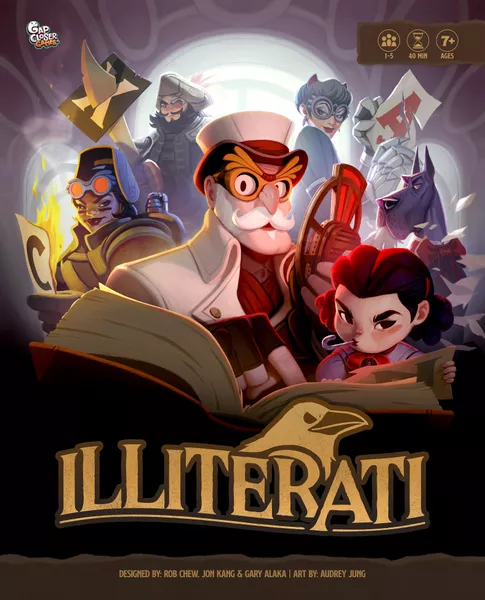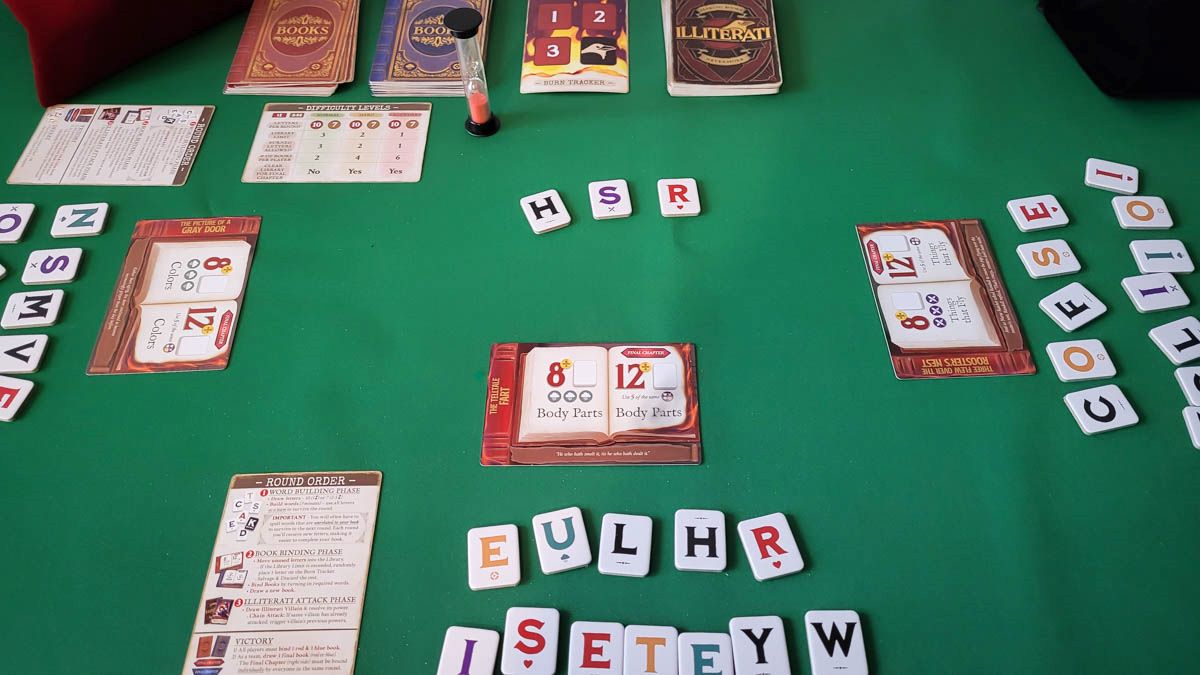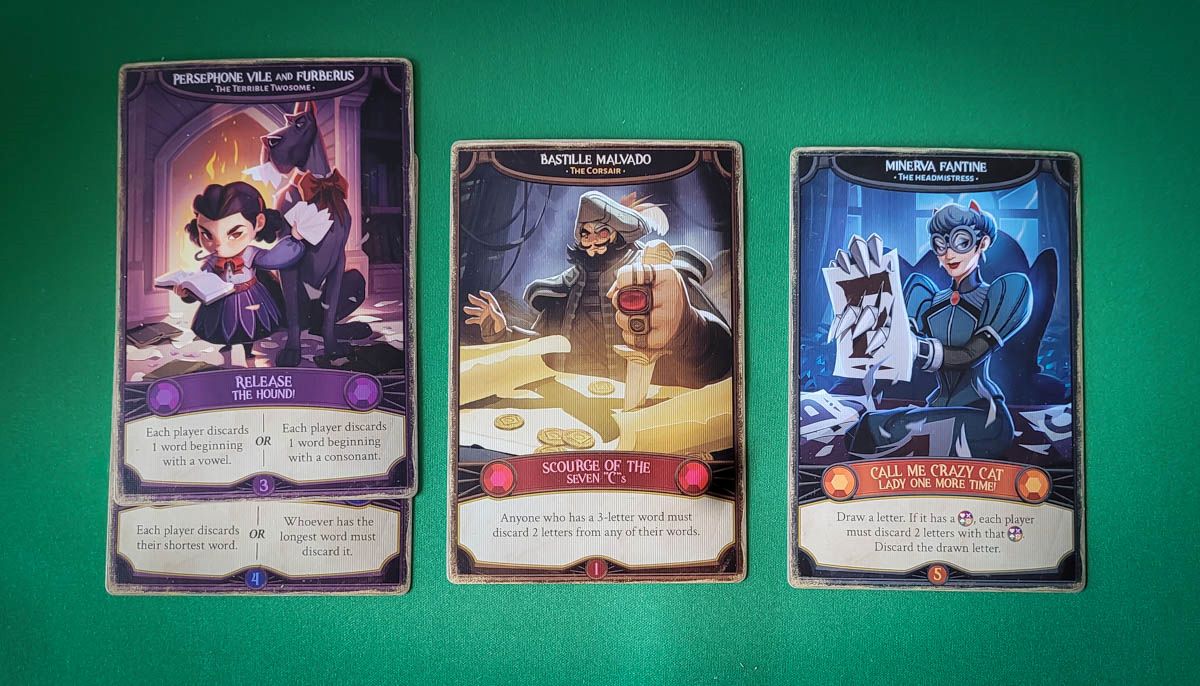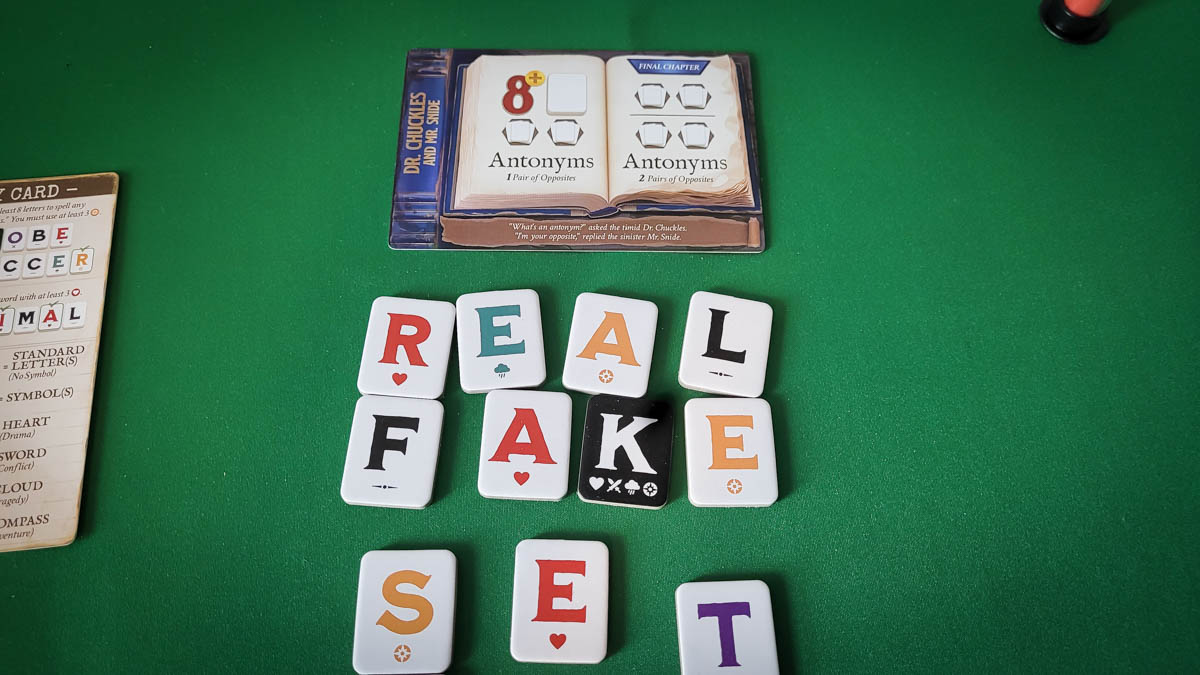Illiterati Review
Year: 2023 | Players: 1-5 | Minutes: 30 | Ages: 7+
This Illiterati review was made after playing the game eight times, with at least two games played at the two, four, and five-player counts.
What is Illiterati?
Illiterati is a cooperative real-time word game in which you bind books by forming words from a random draw of letters.
Illiterati was designed by Gary Alaka, Rob Chew, and Jon Kang, and it is published by Gap Closer Games.
Rules Overview
Your goal in Illiterati is to work together to bind a certain number of books before you lose/burn too many letters. Thematically, there is an evil group known as the Illiterati who want to make the whole world illiterate and you’re trying to make sure there are books for people to read.
The core rules of the game are pretty straightforward. There are three phases in each round:
1. Word Building Phase
During this phase, everyone draws seven letter tiles from the bag (adding them to their current letters) and you have three minutes to spell words. Each player will have a Book card in front of them that shows the types of words they need to form; you also often have to include letters that have specific suits on their tiles. Your main goal is to spell words that help you bind the books, but you can spell any 3+ letter words.
You can share letters or even words with your teammates, and any letters you can’t or don’t want to use can be put in the Library area. There is a limit to the number of letters that can be in the Library at the end of the round, though.
2. Book Binding Phase
During this phase, you check that everyone has valid words, you burn excess letters in the Library, and then you bind books.
If there are any invalid words, you move all of those letters and any unused letters to the Library. If you end up over the Library limit, you flip over all of the letter tiles in the Library and randomly choose one to burn. If you burn too many letters during the game, you’ll lose.
That’s why it’s important to not only spell words that work toward your objective but also any other words you can think of. As long as letters are used in correctly spelled words, they won’t get burned.
The other way letters get burned is if anyone has more than eight words in front of them at the end of the round. This usually happens when it takes you too many rounds to complete your objectives since everyone will be gaining seven new letters each round.
To bind a book, you make sure that you have completed the Book card’s objective. If a player binds the number of books needed (based on the difficulty level), they can focus on helping their teammates in future rounds.
If everyone has bound the correct number of books, you move on to The Final Chapter. There you’ll draw one last Book card and everyone attempts to complete the Final Chapter objective, which is tougher than the normal objectives.
3. Illiterati Attack Phase
During this phase, you draw an Illiterati Villain card and resolve its effect. The villains’ powers vary, but they always make you discard letters.
If you draw a villain you’ve already drawn in a previous round, you stack the card on top of the previous ones and you activate all of that villain’s powers (chain attack).
You’ll win the game if everyone can bind the Final Chapter in the same round. Otherwise, you keep playing until you win or lose in a future round.
You’ll lose if you burn too many letters or if you run out of Villain cards.
The rulebook also includes a competitive mode (1v1 or teams), a Junior Mode for kids, and a variant that gives the villains additional powers when they chain attack. Those villain powers include not allowing a player to use their hands during a round and forcing players to speak in accents, among others.
Pros and Cons
Pros
- The thing I like most about Illiterati is how challenging it is, especially once you move past the normal difficulty level. It’s very easy to get stuck trying to come up with words that make sense for your Book card, and the timer adds on even more pressure. It’s the toughest cooperative word game I’ve played, but I don’t find it frustrating.
- I like that part of the game is spelling any words that you can come up with, not just the ones you need to bind your books. I think this is the first word game I’ve played that has that. It’s actually a huge part of the game because it’s the only way you’re going to prevent letters from being burned.
- There is a lot more cooperation going on in Illiterati than you’ll find in most other co-op word games. You have to pay attention to your letters and your teammates’ letters, and you need to communicate well if you want to pull off the win.
- I always like original themes, and Illiterati definitely has one. Binding books to save the world from illiteracy? That’s just a cool theme for a co-op game.
- I’m a big fan of the artwork on the Villain cards. Honestly, without that art, I don’t think the theme would come through for me.
- There aren’t a lot of great 5+ player co-op games, but Illeterati plays very well at the five-player count. In fact, I’d say it’s better with more players because the chaos level goes up quite a bit (my group likes that) and it’s harder for someone to take over and spell words for other players (see my “Quarterbacking” con below).
- Like most word games, Illiterati has plenty of replay value. You never know what letters you’re going to get or in what order you’ll get the Book cards, and the villains throw everything off in different ways.
Cons
- Illiterati’s replay value is high, but I still wish they had included more Book cards. It’s 20 of both types, but you see all of them pretty quickly.
- Quarterbacking can be an issue in this game. Since everyone is basically using one big pile of letters, someone who is a bit better at coming up with words can take over and spell other players’ words for them. This is a group issue more than a game issue, but it’s still something that could affect a lot of groups.
- The sand timer has gotten stuck a couple of times during our games. Minor annoyance.
Final Thoughts
Most of the people in my main gaming group love word board games and high-tension real-time games, so Illiterati is kind of perfect for us. It’s addictive, it’s very challenging once you move past the normal difficulty level, and it’s satisfying every time you’re able to work together to get through a round without burning any letters. I’ve played it eight times so far and I like it even more now than I originally did because my group found a strategy that works for us.
The chances of you liking Illiterati depend highly on you enjoying both real-time and word games. If you or someone you play games with regularly has a tough time coming up with words on the fly, Illiterati might be more frustrating than fun.
If you do like real-time games and word games, I think you’ll be a fan of Illiterati.
- Illiterati was added to our Best Real-Time Board Games list!
- It was also added to the Best Word Games list!
Illiterati Links
BGG | Amazon | Miniature Market
Thanks for taking the time to read our Illiterati review!
Be sure to also take a look at our Top Co-op Board Games page and the other board game rankings.
Subscribe to our newsletter if you want more co-op board game content sent right to your inbox!
